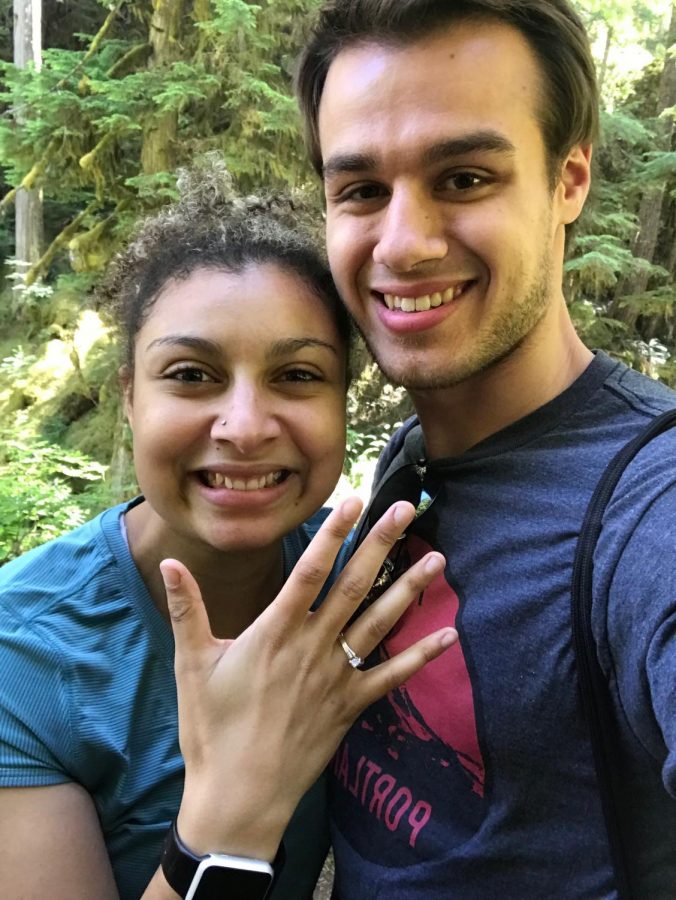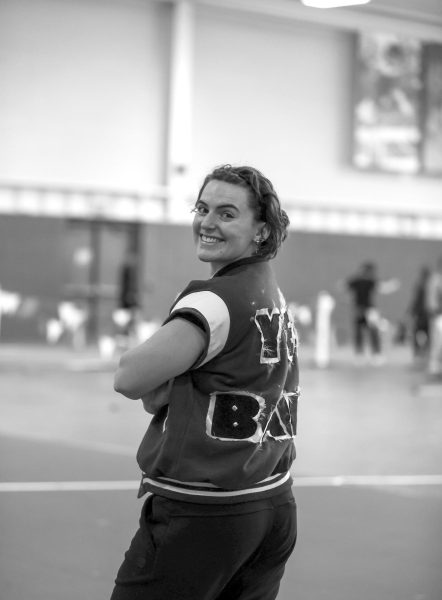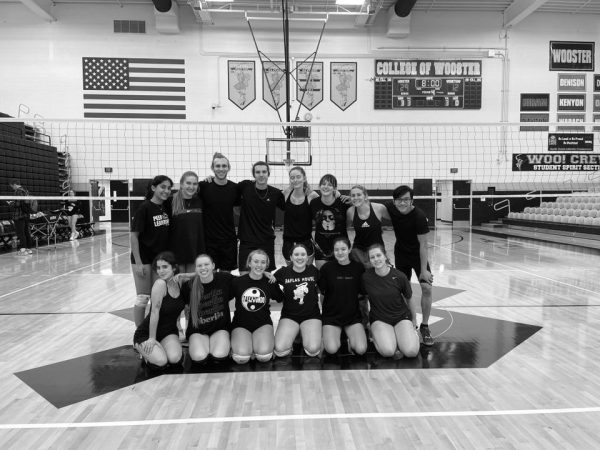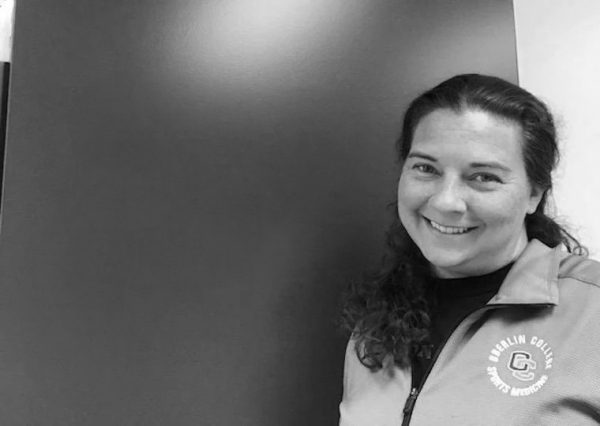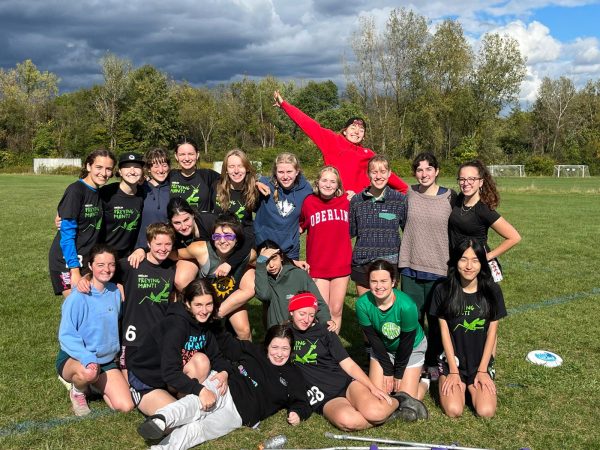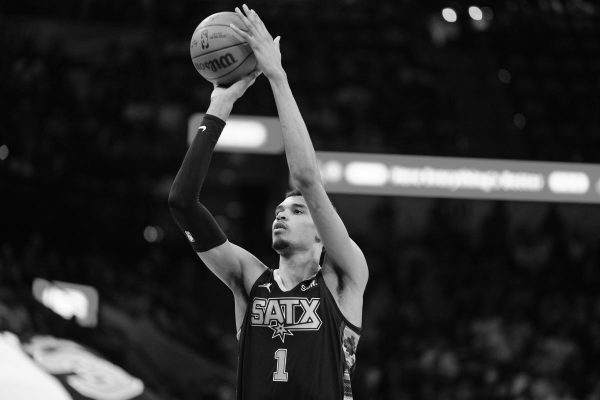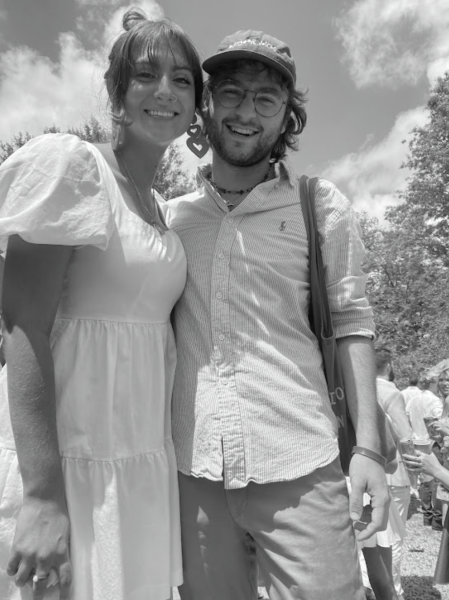In The Locker Room with Emily Kelly and John Olsen, Engaging, and Engaged, Track Captains
Emily Kelly and John Olsen
College seniors John Olsen and Emily Kelly have been dating for nearly six years. Olsen, an Economics major and History minor, and Kelly, an East Asian Studies and Politics double major with a concentration in Chinese studies, have won a number of accolades leading up to their final season on the track. The Lake Oswego, OR, natives got engaged this summer and are now sprint captains for the men’s and women’s track and field teams, respectively.
This interview has been edited for length and clarity.
How long have you both been competing as track athletes?
Emily Kelly: I have been competing since the third grade, so this is my 14th year. Got in the blocks when I was in fifth grade.
John Olsen: I started in eighth grade, and I did track and lacrosse at the same time, both spring sports, because I couldn’t choose one. And then in high school, I was like f **k lacrosse, I’m just going to do track.
EK: The culture’s different than lacrosse.
JO: Very different. I started lacrosse in third grade and played for five years. I actually started doing track in eighth grade because I had a crush on one of the girls on the team — that’s the only reason I did it. She was my ex and I was still head-over-heels.
EK: She was actually a very good friend of mine. That’s how I met him, through her.
So how did you two meet?
JO: It’s a whole soap opera.
EK: The short version is that I was forced to hang out with him and his friends because one of my best friends had a really big crush on him for like two years, and she was like, ‘please be my wingman and let me hang out with him.’ I was interested in other people at the time, so I was like, ‘eh.’ But then we became really good friends and bonded, and then I dated his best friend — his best man in our wedding — and also dated his other friend, who’s also a groomsman in our wedding, and we’re all really good friends now.
JO: It was like a freshman year, two-month relationship.
EK: Yeah, it wasn’t a big deal. [John] ended up not dating [my best friend] at all, he only dated [her] twin sister — who is my other best friend. We actually dated literally at the same time.
JO: Remember when you said ‘short version’? This is literally every detail.
EK: No, there’s way more detail. So basically, I broke up with my boyfriend, [John’s girlfriend] and John broke up, and then John and I started becoming closer. Then, at the winter formal dance on my birthday — my 16th birthday — he asked me [to be his girlfriend].
JO: Basically the short version too, is that we kind of casually dated a lot of people in the same circle, and then when we started dating, we both had the expectation this was going to be another casual whatever-thing. Neither of us [were] thinking we were going to be together for the rest of our lives.
EK: And nobody was happy about us dating.
JO: Yeah, there was drama around it, because it’s stupid and it’s high school.
EK: Yeah, it was really weird, everyone was like, ‘you’re definitely going to break up.’ Every time I came home for the first four months in my relationship with John, my dad was like, ‘did you guys break up yet?’ Not kidding. At least like every couple of weeks, he [asked].
Was coming to Oberlin a joint decision?
EK: I applied Early Decision. I knew that I wanted to go to Oberlin no matter what, whether or not [John] went to Oberlin. And we actually found this letter that I wrote to him from our senior year of high school, and I was talking about, like, ‘hey, I’m ready to do distance if you want to do distance and it’ll be fine, I love you.’ Which is pretty funny to read because we read it right after our engagement.
JO: My getting into Oberlin was very convoluted. We knew about Oberlin because her older brother played for the football team, so we were both recruited kind of through that. My junior year was when I started seriously looking at it. It was on my radar before because of her brother, [Adrian Kelly, OC ’17], but we both started seriously considering it junior year. The thing was, my parents both really wanted me to stay local, and I’m the first person in my entire extended family to go private. The expectation was public school in Oregon — cheap, close to home. And then I really wanted to leave. So basically my college applications were eight schools on the West Coast and then Oberlin. [Emily] got in Early Decision, and then I was sweatin’.
EK: It was a sad day when I got my letter.
JO: Because I didn’t think that financially I’d be able to go to Oberlin. Coach [John] Hepp every week was calling me, and I was like, ‘yeah, as much as I want to go, the bottom line is, if I can’t pay, I can’t go.’ And that’s what I thought was going to happen up until I literally got an extension from Oberlin and from two other schools that I was still negotiating with [for] financial aid. So [Emily] got in as early as you can, and I got in literally after the deadline. It was six months of just stress, because it was like, ‘oh my god, are we going to be doing long distance, are you going to be out in Ohio and I’ll be in, like, California?’ But in the end it worked out with financial aid and with my parents. We were able to figure out a way for me to get out here.
EK: It was dramatic.
How does being engaged affect how you lead as captains?
EK: It’s hard because you don’t want it to seep into your romantic life, and so the first week or two was hard because we didn’t really know how to communicate and how to balance each other out. And we don’t really know how to be captains; we’ve never been captains before.
JO: That’s not true — high school.
EK: OK, in high school we were team captains, but high school it’s like —
JO: It’s a different beast than college. In high school it was like, ‘alright, captains, just be the example for warm-up, and then coaches take it away,’ whereas here, captains practice — we are running everything. We’re coordinating the practices [and] the lifts, we are reading the workouts days in advance and memorizing them, and teaching them back. There was some friction early on, trying to balance it out so that neither of us felt that we were overshadowing the other during practice, which is something we’ve talked to James [Tanford, OC ’18] and Lilah [Drafts-Johnson, OC ’18] [about]. What made it unique, is that for James and Lilah if there was stepping on toes, they just go home and talk about it later — we go home together. So we have to be careful that if there’s any friction during practice, that that didn’t bleed into our personal lives.
EK: In some ways it’s good because we’re forced to talk about it immediately.
When are you getting married?
EK: July 6, 2019. It’s going to be a very small wedding. We can’t afford a banger.
What are you most looking forward to this season?
EK: To [getting] on the track and getting healthy and actually running. I’ve been battling health issues since I graduated from high school, and I’m finally on asthma medication that I’m hoping is actually going to work. I’ve just been going through doctors and medication for my entire career here, and I’m hoping this will be the year that I’m actually able to get on the track and run. I’m very excited to have a close relationship with all [of ] my [first-years]. It’s been really cool, I’ve been getting to know them; we have girls’ nights on Friday nights where we can just talk and hang out.
JO: Having a new coach is both stressful and exciting at the same time. So far I’ve really loved the way that [Coach Ben Wach has] been doing stuff. This year he really wants to focus on speed, so I’m going to be doing more 200s and even maybe some 60-meters indoors to focus on building up speed, because the way he put it, [I’ve] been doing endurance running for [the past] three years, [so] now we’re going to focus on the first 50 meters [of the 400] being as fast as they can. I’m excited to start doing some more shorter distance because that’s something I don’t usually get to do, but I enjoy.
What are your plans for after college?
EK: I’m trying to go to law school. That is definitely the main game plan right now. And we’re hoping that I’ll figure out my law school stuff pretty early so that John will have time to look for jobs around where I’m looking for law schools, and we’ll try to figure it out based on where he can find jobs and where I’m trying to go to law school.
JO: The ideal timetable now is that we’ll know where she’ll be around December, and that should give me enough time hopefully to find something in the area. Really we’re trying to stay in the West, so maybe we’ll go back to Oregon, or go to California. We’re also looking at Colorado [because] I have family [there] and we have history [there]. I’m not going to do grad school, so I’ll be looking for work wherever [Emily] ends up.
Do you know what kind of work?
JO: In a perfect world, I would love to be doing advertising, but it’s kind of a hard field to break into straight-away, so I’ve also been looking at market-analysis [and] data analysis with economics, or econometrics.
What legacy are you trying to leave on the track team — individually and together?
EK: My main goal as a captain this year is to foster a community of inclusion, and I’m trying to do that not just with the [first-years], but also people coming back to the team as well. It’s a large team and it’s easy for us to be scattered, especially between the cross country team and the track team, and everyone has their own group messages and their own individual cliques, but my focus this year has been trying to bridge those gaps and make us all a very close team.
JO: Along similar lines, Emily, [College senior] Jahkeem [Wheatley, jumps captain], and I have been doing a lot of work trying to bring everyone together — on the track and off the track, as well. We’re really trying this year to make it feel like a collective team, and I think so far we’ve done a good job of that. I really hope that when we leave, that culture stays — because that means we did our job.
If we leave [and for] the class[es] beneath us, it’s felt like, ‘oh everyone is a team, the jumpers and sprinters are warming up together’ — and we’ve been doing that now, warming up and working out with the jumpers which never used to happen — if that’s the culture we can build, and mak[e] the norm, that’s going to make a more cohesive and successful team for years to come for Oberlin. I’m really hoping we can leave that precedent.


